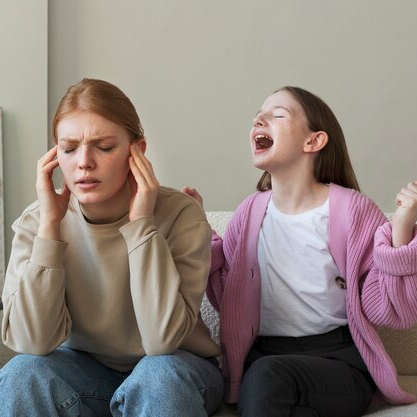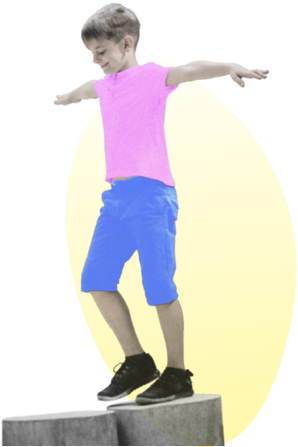BLOG
Is ADHD Causing Your Teen’s Emotional Outbursts?
Life looks different in every household. Sports, dance, art classes, tutoring appointments, or therapy appointments can impact teens’ routines. As parents, it can be hard to remember that teens will likely have packed schedules as an adult, so it is okay to slow down to take a moment to breathe and enjoy them while they are still under your roof. By staying positive and learning to implement boundaries, routines and structure, you can help your teen thrive!
Emotional Toll
Keeping up with assignments, personal hygiene, and the latest trends, all the while preparing for ADULTHOOD?! This can be fairly demanding for many teens.
Teens with ADHD often have a more difficult time maintaining focus and appropriately demonstrating behavior at school and home when these topics become high priority. This can lead to emotional regulation issues which may look like angry outbursts such as yelling or screaming, teenage temper tantrums like stomping feet, slamming doors, etc.
When ADHD is Not Addressed
Symptoms such as impulsivity, irritability, meltdowns, angry outbursts, or lack of awareness of hunger can result in excessive use of electronics and video games or some teens may reach for drugs, food, or alcohol to self-regulate.
This becomes an unhealthy self-soothing tool and can result in difficulty focusing due to exhaustion, lack of motivation, emotional highs and lows with parents, siblings or other family members in the home.
Strategies for Families We Recommend
1. Routine = Predictability
It is easy to start being more relaxed with routines as your child gets older. However, like when they were younger, teens thrive on routine, order and knowing your expectations. Encouraging the whole family to take part in these routines can help too.
Teens with ADHD shift focus quickly and often. Providing structure and support can greatly change the entire day for you and your family. Remember consistency is your friend. Here’s an example of a strong after-school routine:
- After school: Check in with teens about their day and any homework that needs accomplishing while they munch on some veggies, protein, or other nourishing snacks.
- Homework and Chores: Let them choose if they want to start with their daily chores or their homework. Once they accomplish both, they are ready for some relaxation.
- Family dinner Research shows that teens in families that have dinner together tend to have significantly better medical and mental health outcomes. Eating food at the appropriate times gives their brain and gut time to digest and get ready for sleep and the next day.
- Sleep routine: Sleep is important for everyone… including parents. Having downtime with teens helps parents have better outcomes too. Set flexible bedtimes that allow some choice, but ensure enough rest, and outline proper wake times for teens. This will dramatically improve their quality of sleep and natural circadian rhythm. This can become more flexible as habits become more ingrained and routine.



Proper ADHD diagnosis unlocks WHY children & teens feel stuck & guides what they can do to FEEL BETTER now.
2. Remove Distractions
Remove potential distractors when tasks and routines are being performed.
- The Cellphone: This is the ‘BEST/WORST’ distractor and most loved object that your teen can possess.
- The Internet: Parents are the ones paying the bills. Parents have the right not to provide service to that amazing cellphone if routines are continually challenged or ignored. You can set limits on how much data/wi-fi time your teen can access.
3. Exercise
Children with ADHD should engage in regular physical activity, this can make a world of difference! Encourage teens to participate in sports or extracurricular activities that involve getting out and using some of that boundless energy. If those are inaccessible or not preferred by your teen, try scheduling a family outing that gets everyone’s heart rate up.
Here are some ways you can do that:
- Go on a hike or walk together
- Try a new game, like frisbee golf
- Go for a bike ride
- Head to the beach for an afternoon
- Play horseshoes, bocce ball, or croquet in the backyard
- Ask teens what they would like to do!
4. Contact Whole Child Collective
If you feel like you have tried and exhausted all resources and ideas, contact Allie, our office manager at the Whole Child Collective. We are a group of licensed clinical psychologists that specialize in evaluating and treating children, teens and college age youth.
We possess years of training, including postdoctoral fellowships with children and adolescents in medical/ settings/children’s hospitals, and we are here to help parents and teens manage symptoms of ADHD at home and get proper support at school.
Evaluations offer limitless insight into the inner workings of your teen’s brain that empowers them for the future. We help parents and teens get to the root causes of what drives their behavior, and we help uncover new strategies to point teens in the right direction, with the proper levels of support on board to gain confidence for life!
4. Contact Whole Child Collective
If you feel like you have tried and exhausted all resources and ideas, contact Allie, our office manager at the Whole Child Collective. We are a group of licensed clinical psychologists that specialize in evaluating and treating children, teens and college age youth.
We possess years of training, including postdoctoral fellowships with children and adolescents in medical/ settings/children’s hospitals, and we are here to help parents and teens manage symptoms of ADHD at home and get proper support at school.
Evaluations offer limitless insight into the inner workings of your teen’s brain that empowers them for the future. We help parents and teens get to the root causes of what drives their behavior, and we help uncover new strategies to point teens in the right direction, with the proper levels of support on board to gain confidence for life!





